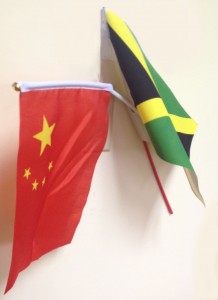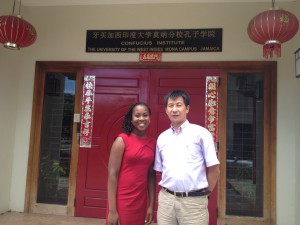 The minute I found out I was heading to Jamaica, I just knew I had to make my way over to the Confucius Institute. The role of Confucius Institutes is to provide Chinese language instruction and promote Chinese culture, primarily with the hopes of fostering sociocultural exchange in countries that China maintains partnerships with. With about 400 of them across the world (70-80 of which are in the United States), I was curious to know how they get established and in particular, how the Chinese government is using them to make inroads into the Caribbean.
The minute I found out I was heading to Jamaica, I just knew I had to make my way over to the Confucius Institute. The role of Confucius Institutes is to provide Chinese language instruction and promote Chinese culture, primarily with the hopes of fostering sociocultural exchange in countries that China maintains partnerships with. With about 400 of them across the world (70-80 of which are in the United States), I was curious to know how they get established and in particular, how the Chinese government is using them to make inroads into the Caribbean.
Located at the University of the West Indies – Mona, the Confucius Institute in Jamaica was founded in 2009 and is one of four in the Caribbean region (the others are in Trinidad and Tobago, the Bahamas and in Cuba).  I had the opportunity to meet with the Chinese director while there (there is a host-country director as well) and was surprised to learn that it is actually a university in the host country that applies to China asking for a Confucius Institute to be established at their institution. If the application is accepted, the Chinese government then identifies a university in China to serve as a partner institution providing teachers, volunteers and materials to the Confucius Institute.
I had the opportunity to meet with the Chinese director while there (there is a host-country director as well) and was surprised to learn that it is actually a university in the host country that applies to China asking for a Confucius Institute to be established at their institution. If the application is accepted, the Chinese government then identifies a university in China to serve as a partner institution providing teachers, volunteers and materials to the Confucius Institute.
Students at UWI – Mona are able to take up to four levels of Mandarin for college credit and courses are also available to the community at-large for $15 (US) twice a week (at an hour and a half per session, for thirteen weeks). There are currently 50 students taking advantage of this opportunity and about twenty community members. Even high school students were exposed to Mandarin through a pilot program a year ago and the institute regularly hosts festivals and public lectures.
Now, what does this all mean for China’s goal of promoting sociocultural exchange? Like most of its initiatives in the region, China has taken a very strategic and pragmatic approach to developing a better understanding of its culture. The challenge is, I do not know that Caribbean countries have made similar attempts to cultivate an appreciation of their people and heritage the way China has – nor can I definitively say that they should.
However, with large-scale Chinese-backed projects throughout the Caribbean, and little to no local engagement to accompany them, perhaps more cross-cultural exchanges is not so bad of an idea in at least initiating important conversations that will inevitably affect community economic development in the region.


About The Author: Vanessa L.
More posts by Vanessa L.